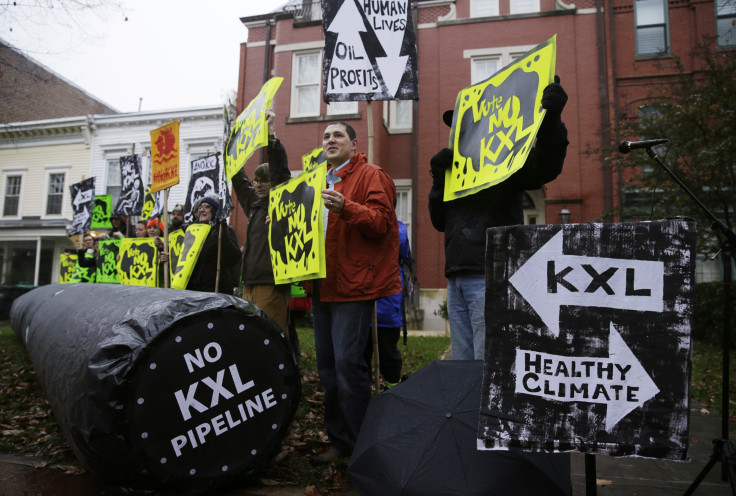Anti-Keystone XL Movement Is Inspiring Fights Against 10 Other Oil And Gas Pipelines: WSJ Analysis

The battle to stop the Keystone XL oil pipeline has inspired fights against at least 10 other oil and gas infrastructure projects in North America, a Wall Street Journal analysis found. Tens of billions of dollars and thousands of miles in new pipelines are being delayed as national environmentalist groups and local opponents increasingly join forces.
Six oil and natural gas pipeline projects in North America worth a proposed $15 billion and measuring over 3,400 miles have been delayed by prolonged government reviews and environmental impact studies, according to WSJ. At least four other pipelines, worth a collective $25 billion and stretching more than 5,100 miles long, are being targeted by opponents but haven’t yet been delayed, WSJ reported.
“We used to think about risks in the energy business primarily related to how we are going to get more supply,” Al Monaco, president and CEO of Enbridge Inc., said in a recent speech in Calgary, Alberta. “The reality is that today in North America, it’s not about that. It’s about how we get our product to market.” The Canadian company is facing delays on four pipeline projects worth a total of about $10 billion, WSJ noted.
In the effort to block the Keystone XL, which TransCanada Corporation first proposed in 2008, major environmentalist groups, including Sierra Club and 350.org, have teamed up with local activists, including landowners, tribal leaders and farmers. The $8 billion pipeline would stretch nearly 1,200 miles from Alberta’s oil sands region to Steele City, Nebraska, where it would link to an existing segment that ends in the Texas Gulf Coast.
The green groups argue that the pipeline would accelerate the development of Canada’s high-carbon oil sands crude, pumping huge quantities of greenhouse gases into the atmosphere at a time when countries are struggling to combat climate change. Local organizers say they are worried that the pipeline could damage their properties and environmentally sensitive areas if any of the viscous Canadian crude leaks into the ground or water. TransCanada maintains that the project’s climate change impacts would be negligible and that the Keystone XL would be “the safest pipeline ever built.”
Working together, opponents have succeeded in delaying the project by challenging proposed pipeline routes and government environmental impact reviews. In Nebraska, a local court invalidated the Keystone XL’s proposed route through the state, though Nebraska Gov. Dave Heineman has appealed. The Nebraska Supreme Court is weighing the case, and a final verdict could come in early 2015. President Barack Obama, who has the final say on the project because it crosses the U.S. border, is delaying his decision until the Nebraska case is resolved.
In South Dakota, 350.org, a leading climate advocacy group, is participating in state regulatory proceedings regarding a critical construction permit. The state’s public utilities commission is considering whether to renew TransCanada’s certificate after the paperwork lapsed earlier this year. More than 40 local activists have aligned with 350.org to encourage regulators to deny the permit.
This national-local strategy has become a template for activists to oppose other pipeline projects, according to the WSJ story. Kinder Morgan Inc., for instance, has been forced to delay a $4.8 billion expansion of its all-Canada Trans Mountain pipeline after activists staunchly opposed the Houston company’s original route.
“There is a new normal of conversation and debate that is occurring around pipeline infrastructure projects,” Ian Anderson, president of Kinder Morgan’s business segment in Canada, told WSJ. He said that a Trans Mountain expansion in 2008 drew “little or no opposition or media scrutiny” at the time.
© Copyright IBTimes 2024. All rights reserved.











